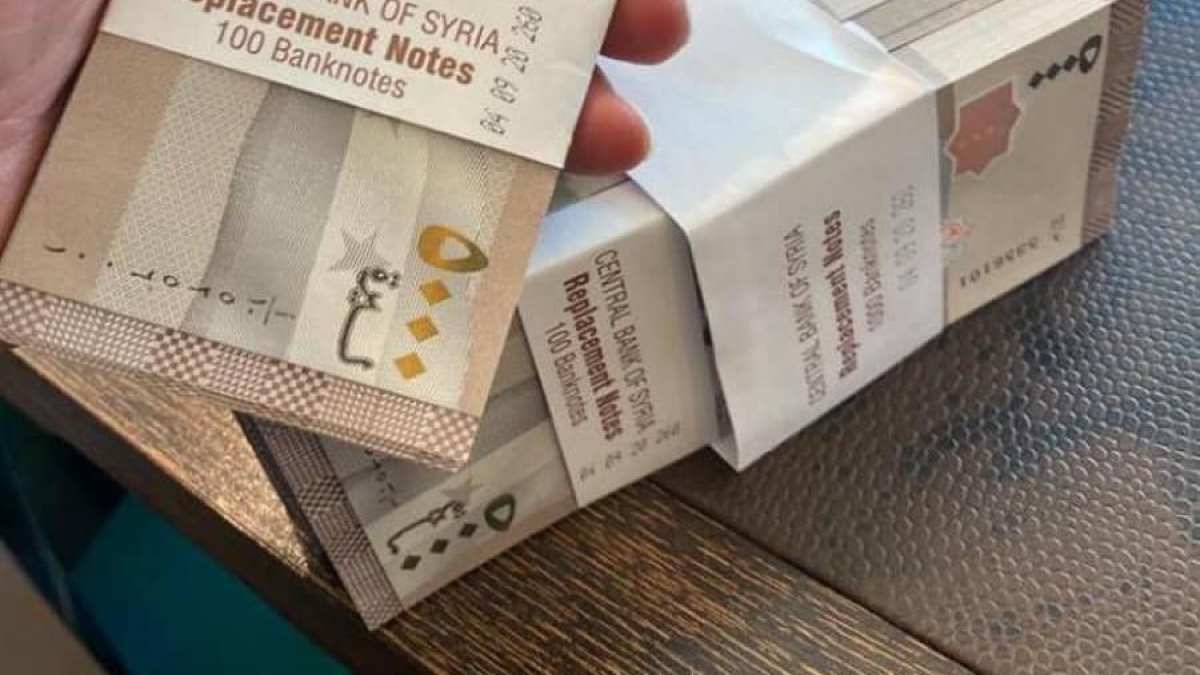The Syrian pound has recorded successive losses since Decree 3 of 2020, which prohibits dealing in currencies other than the Syrian currency (Al Jazeera)
Northern Syria -
The Syrian pound continues to record new losses in its value against the dollar, approaching 15,000 Syrian pounds per dollar in transactions yesterday, Wednesday, in the wake of the Syrian regime’s recent decrees that prevent the trading of foreign currencies in transactions and payment, and tightens control over the black market and workers in Exchange and money transfers.
Contrary to the expectations expected from the regime’s government to allow the free circulation of foreign currencies, and to abolish penalties for dealing in currencies other than the Syrian pound, the two decrees tighten control and penalties, contribute to the government’s monopoly on foreign currencies, and limit dealing through financial channels close to the authority in the country.
Economists believe that the decrees would further deteriorate the value of the Syrian pound, despite the recent relative stability, in addition to their negative impact on merchants, in light of their loss of confidence in the pound and their reliance mainly on the dollar in commercial transactions.
What is the content of the two decrees?
Legislative Decree No. 5 of 2024 affirmed the prohibition of dealing in currencies other than the Syrian pound as a means of payment or any type of commercial trading, and preserved the penalties related to imprisonment or imprisonment, but it allowed defendants to settle before the judiciary, so that the imprisonment or imprisonment penalty that could reach up to In some cases, more than 7 years.
Economists confirm that pursuing exchange offices has deprived the country of foreign exchange through unofficial exchange channels (Al Jazeera)
Decree 5 does not apply to a non-resident foreigner or foreign investor in Syria, and foreign trade acts are not considered a punishable offense in applying the provisions of this decree.
Regarding money exchange and transferring money abroad, Decree No. 6 of 2024 showed a tightening of penalties for those who practice the money exchange profession without a license, and those who transfer or transfer foreign or national currencies between Syria and abroad without a license.
The decree punishes this with temporary imprisonment from 5 to 15 years, a fine of three times the confiscated amounts, provided that the fine is not less than 25 million Syrian pounds, and confiscation of the seized amounts in cash.
"Deadly Decree"
The economic advisor and head of the Syrian Economy Working Group, Osama Qadi, believes that the idea of dealing in currencies other than the Syrian pound and closing the exchange centers has failed miserably, stressing that Decree No. 5 did not prevent the decline of the Syrian pound, or slow down the process of the collapse of the currency.
In an interview with Al Jazeera Net, Qazi describes Decree No. 3 issued by the Assad regime in 2020 as a “deadly decree” for the economic system in Syria, because it reduced economic activity to less than 20%, and deprived the Syrian regime of the next billions in remittances from expatriates and workers abroad. .
Osama Qadi said that the exchange rate was a thousand liras to one dollar when Decree 3 was issued in 2020, while today it exceeds 14 thousand liras, considering that there are those who implicated the Syrian regime in issuing these decrees.
The Syrian economic advisor expressed his belief that Decree 5 is an operation to blackmail merchants dealing in non-lira currencies, when they were allowed to settle in the judiciary through sums of money paid to the state treasury, due to the regime’s urgent need for foreign exchange.
Commercial exposure
In the city of Aleppo, which is considered the country's economic capital, money exchange and money transfer workers spoke of their fears of security prosecutions by the Syrian regime authorities, stressing that they are now working with the utmost caution, as a result of the decrees that persecute them and limit informal financial transfers.
Money exchange and money transfer workers in Aleppo expressed their fears of security prosecutions by the Syrian regime if they do not adhere to the (French) decrees.
A money changer (who refused to reveal his name for security reasons) said that most transactions now take place on the street, whether through delivering remittances or exchanging foreign currency, carried out by intermediaries under assumed names.
Economic analyst Younis Al-Karim believes that the regime’s government’s strictness in prosecuting dealing in currencies other than the Syrian pound stopped all unofficial channels that pumped dollars into the market and individuals and organizations, who in turn converted them into the Syrian pound, explaining that these dollars were flowing into the hands of merchants for import or exchange companies that came. To the Central Bank of Syria.
Al-Karim said - in an interview with Al Jazeera Net - that Decree No. 5 came to emphasize Decree No. 3, to prevent trading in currencies other than the Syrian pound, as a result of the Syrian economic situation, which is suffering from recession, at a time when about 95% of the Syrians’ needs are imported, including agricultural goods.
Al-Karim added that the Syrian pound has practically lost its purchasing power, as a result of increased commercial exposure in areas controlled by the Syrian regime, and the rise in imports at the expense of exports, indicating the presence of a structural defect and shortcomings of the legislator who recommended a decree prohibiting dealing in currencies other than the lira.
According to Al-Karim, allowing commercial transactions to be carried out in foreign currencies and dollars and not limiting them to the Syrian pound only would lead to the supply of foreign currencies being greater than the demand for them.
Source: Al Jazeera

